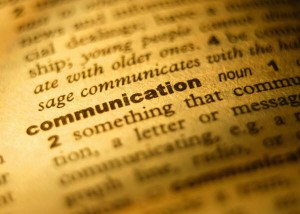
There are many definitions of communication. Out of which the most widely accepted being,
By Eric Moonman, The Manager and The Organization.
“Communication is the activity whereby an individual or group conveys, consciously or unconsciously information to another individual or group and, where necessary, evokes a response. The information transferred maybe facts, feelings, or ideas.”
Communication might be usefully defined as the process by means which meanings are exchanged between people through the use of a common set of symbols (Languages).
This is simply identified as the channel, which exchanges information, emotions, suggestions, grievances, and opinions between the management and employees.
To understand the nature of the problems facing communication systems in the organization, there needs to be a study of what actually takes place within the communication process. The process is concerned with transmitting and receiving messages; these messages may be in the form of written or spoken language, or in symbols. However, in all cases the aim would be to transfer the said message accurately.
In very broad terms, the purpose of communication is three fold.
This is considered as the prime and common purpose. Giving data, providing explanations, describing events, introduction of products and services, forecasting of future needs fall under this category.
This type of communication may take the form of an express instruction or order; it may be persuasion or advice. Whatever the form, the purpose is to get the recipient to take particular action or line of thought.
As a result of this type of communication, it is expected that the receiver will change their behavior (that is to do something, or not do something or even do it more efficiently, etc.) Alternatively, the receiver is expected to change his/her way of thinking.
This purpose can be best described as the way in which one expresses his/her feelings to another. For this purpose communicators may express their praise and admiration for other people for perhaps their performance or behavior, they may express sympathy or understanding, show dislike or even apportion blame.
In all cases, you are telling other people what you feelings are towards them or about them or something connected with them, such as their work related performances.
Effective Business Communication will result in,
Effective networking should embrace all those who should essentially need the given information and feedback to achieve their objectives. Care, control and constant updating is required to decide who should be and not be included within the network.
The concept of load is related to the peed and nature of the information flow. The problem of under load arises where the speed of communication and nature of the information is slow that it leads to dissatisfaction. Whereas the problem of overload arises when the flow of information is so great in quality and complexity or both that the system cannot handle it.
The perceptual process determines what messages we select or screen out as well as how the selected information is organized and interpreted. This can be a significant source of noise in the communication process if the perceptions of the sender and receiver aren’t aligned.
Some messages are filtered or stopped altogether on their way up, down, or along the hierarchy. Filtering may involve deleting or delaying negative information or editing them to sound more favorable. Employees and supervisors sometimes filter information to display a better impression of them, which may even result in distortion of the said information.
It is crucial that the management selects the most appropriate medium to communicate with the employees, choosing the wrong medium could very well impede effective communication. The content of the message should also be adequate and appropriate.
This is where employees do not communicate effectively for various reasons. Some of them being, lack of confidence, low self esteem, difficulties in understanding the information given, negligence, disinterest.
Comments are closed.
simple and clear!